
Before, during, and after Hurricane Helene barreled through several southeastern states, flattening and flooding many towns and cities, leaving apocalyptic remnants in her wake and lives unaccounted for, police search-and-rescue task forces mobilized and trudged through the muck and utter devastation.
Despite their senses for sleuthing and uber training in specialized gear, police officers in task force teams are complemented by canines with superior capabilities to discover people via olfactory superpowers.
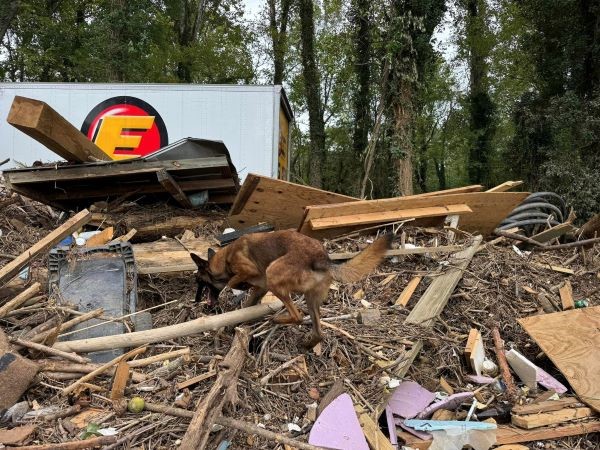
(Photo courtesy of the North Carolina Trooper’s Association K9 Search and Recovery.)
Typically, search-and-rescue outfits come from states unaffected by the conditions causing their deployment. In 2022, the New Jersey State Police and the New York State Police deployed gobs of highly trained troopers to hard-hit Puerto Rico after Hurricane Fiona plowed through the island and made life unlivable.
Similar to certain highly specialized military units, the cops and canines who comprise search-and-rescue cadres are trained, readied, and promptly deployed upon receiving the official call to do so.
Ordinarily, when certain dire circumstances arise (such as the catastrophic destruction and loss of life due to Hurricane Helene), state and federal Emergency Operations Centers’ officials convene and plot operational plans to deploy personnel to hard-hit regions.
These task force groups either travel to the fringe of devastation and work their way in or get airlifted and deposited in the heart of the apocalypse. Sometimes, it is a combination of both, since heavy equipment is part of the S&R equation (digging out trapped individuals and decedents).
Conversely, when members of a S&R team find individuals, they are transported (sometimes on the back of a first responder) to a predetermined LZ (landing zone) where evacuation by helicopter is conducted, airlifting them to safer terrain where medical treatment is administered.
Many S&R contingents are part of a state’s governor’s office, granting authority and jurisdictional scope to succeed the mission, often working in tandem with military outfits such as the National Guard.
The Virginia State Police posted that since September 27, 2024, their “Search & Recovery Team (SRT) responded to the southwest region of Virginia to aid in the swift-water rescue of victims stranded by Hurricane Helene.
“In their three-day mission, this team faced the fiercest storm conditions, slept in their vehicles, and responded to multiple emergency calls for service. In total, SRT safely rescued 16 stranded people, two dogs, and seven cats.”
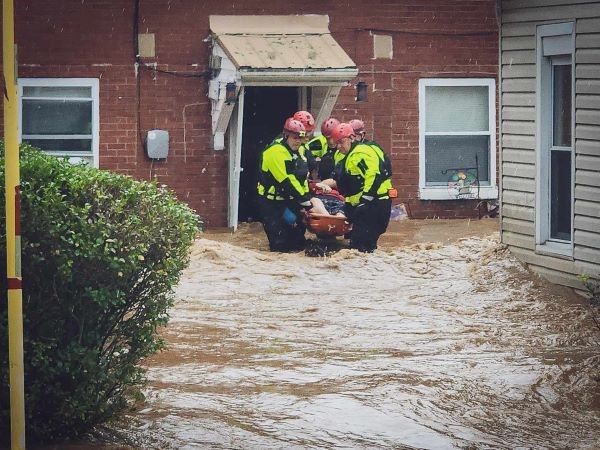
(Photo courtesy of the Virginia State Police.)
As one might imagine given the cause-and-effect circumstances, the conditions are deplorable. Still, the mission is sacred, so these cops often trudge through unnavigable terrain to save lives on the brink.
Despite the inclement conditions and the elements of nature hindering search-and-rescue efforts, the LEOs who comprise these contingents forge forward no matter the inconveniences and spoils, often unrested for long periods.
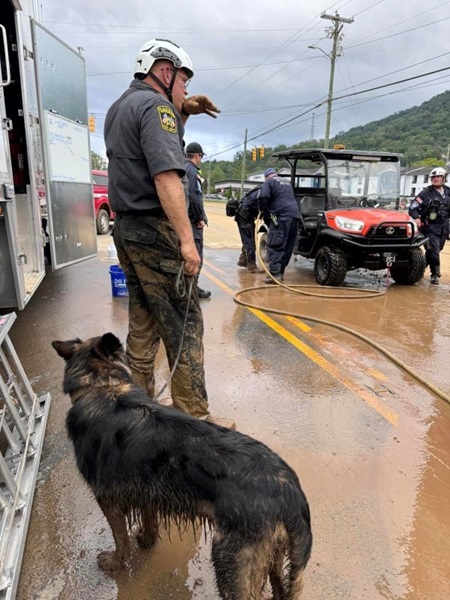
(Photo courtesy of the NC Trooper’s Association K9 Search and Recovery.)
Like most police operations where lives are at stake, cops ride the wave of adrenaline so often accompanying the stark reality of endangerment to others. The equilibrium of searching for life while preserving their own weighs heavily on the minds of police rescuers; to satisfy both objectives, the calculus changes often. That quintessential rush our species exhibits is prevalent.
I’ve experienced the rush during several hurricanes that carved through my jurisdiction. I’ve seen it in the eyes of cops exhibiting zero quit in them, while their minds and bodies are screaming for respite. The Plus-one rule that applies to searches for weapons and people is always on the agenda.
Looking at the New York Task Force 1 assemblage of rescuers, we see a compilation of various specialties among members of the FDNY and NYPD:
“Our FDNY and NYPD members have been hiking through extra challenging conditions to reach those in need” and “evacuated dozens of residents to landing sites for helicopter evacuation, searched hundreds of damaged structures & vehicles with our engineer & K9s, cleared numerous blocked roads, and provided medical treatment to residents.”
Among Task Force personnel are engineer-minded individuals who erect makeshift structures to safely evac people found hunkered down and cut off from routes to salvation.
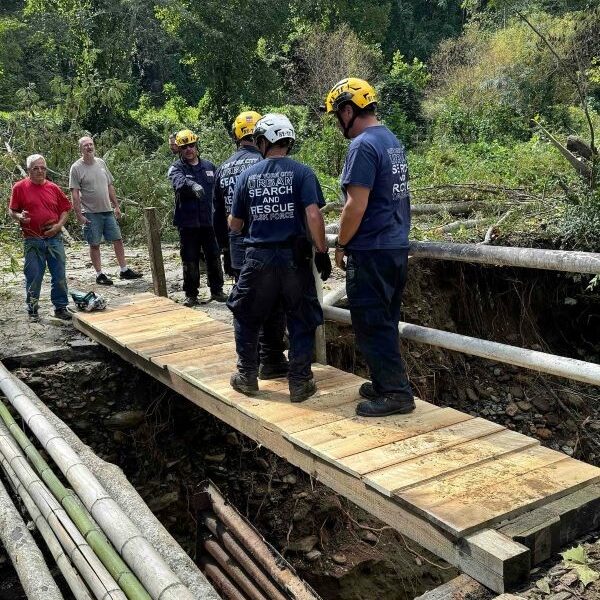
(Photo courtesy of the New York Task Force 1.)
With officer safety always a paramount consideration, Mother Nature’s playbook has predicaments that are not so easy to plan for…until it is too late, making cops and canines vulnerable.
In hard-hit Tennessee, an Erwin Police Department canine team deployed in a search-and-rescue operation sustained a severe loss…
Per Fox 13 News, the East Tennessee police department “is grieving the tragic loss of a K-9 officer who was swept away by the devastating flash floods that ravaged the region in the aftermath of Hurricane Helene.
The Erwin Police Department said Scotty, a loyal and dedicated member of the force, went missing on Friday in the Bumpass Cove area of Unicoi County.”
Reports indicate that K9 Scotty’s body was recovered. K9 Scotty and his handler were out scouting for survivors/bodies since, according to Tennessee All-Hazard Incident Management Team spokesman Myron Hughe, “47 individuals remained unaccounted for,” eliciting the assistance of the police S&R duo and others.
But…amid the forward-charging search-and-rescue teams are brief moments of respite behind enemy lines: makeshift meals are consumed to refuel the body and mind before going back to the frontlines. Teams switch out. Some have lunch on the world’s largest lunch tray…
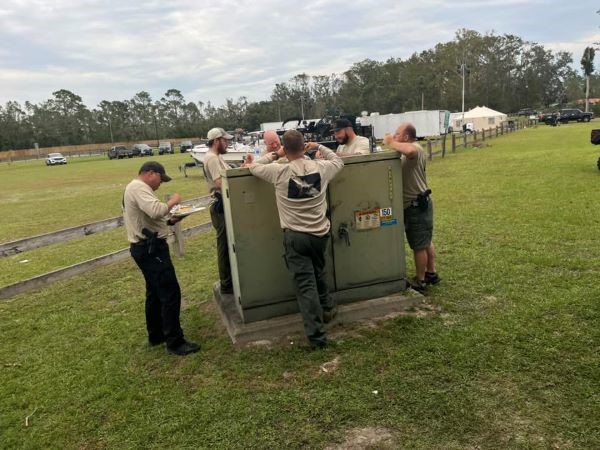
(Photo courtesy of Clay County Sheriff Michelle Cook.)
These search-and-rescue deputies were transplanted from Clay County to Taylor County, Florida, where Hurricane Helene crept from the Gulf of Mexico and made landfall.
In Taylor County is (was) a beachfront known as Keaton Beach, with 90% of structures now being reported as obliterated, hence the allocation of search-and-rescue teams from lesser impacted areas in the Sunshine State.
Recently, endemic information has been spreading, claiming that first responders will be searching for survivors throughout weeks and months ahead, thus potentially resulting in more cadavers as the days pass.
In that regard, backup search-and-rescue teams will also deploy…until every stone is turned upside-down, each fallen tree is chain-sawed and cleared away, police canines exhaustively sniff mounds of debris, targeting signs of human existence.
As of this writing, the death toll is nearing 100. Anecdotally, there are more lives saved due to our nation’s sharply manifested first responders assigned to search-and-rescue units promptly deployed to disaster territories, confronting the aftermath.
One more thing: I keep reading posts from people far from the Hurricane Helene-impacted states who pledge a desire to help but can’t due to distance. Please know these search-and-rescue task forces from all over the country are possible due to your tax dollars… meaning we are all in this together in one way or another.
Make a difference. Support the NPA.